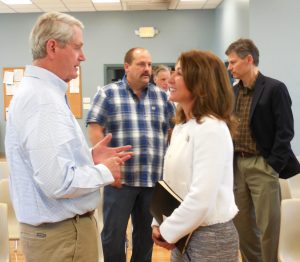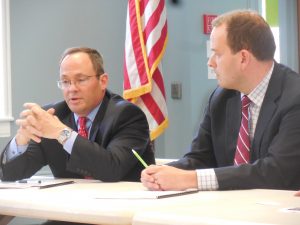
Andrew Myers, chair of the Hilltown Collaborative, speaks with Lt. Governor Karyn Polito before the start of the meeting Thursday. (Photo by Amy Porter)
HUNTINGTON – Lt. Governor Karyn Polito returned to the hilltowns on Wednesday for a meeting with the Hilltown Collaborative at Stanton Hall. In introducing her, Andrew Myers of Chester, chair of the collaborative, said it had been a year since the six towns signed the Community Compact with the Baker-Polito Administration pledging to work together on shared services and economic development.
“It’s been a very busy year,” Myers said. He said his group had worked with the Division of Local Services (DLS), which was presenting a report on shared financial services in the towns at the meeting. The collaborative is also sponsoring an information technology (IT) study in the towns, under the auspices of the Pioneer Valley Planning Commission (PVPC). In addition, there is a new economic development report, and candidates are being interviewed this month for the position of a regional economic development coordinator.
Polito then spoke, introducing Sean Cronin and Zack Blake of DLS. “Please consider this a team effort. I’m sure some of you were a bit skeptical at first,” Polito said of the idea of sharing services between towns. “Thank you for taking the initial steps,” she added.
Polito said since the Community Compact program started, 235 of 351 cities and towns in the Commonwealth have signed on to explore best practices with the administration.
“What I love is that every single compact program is unique,” Polito said. “You are elected business community leaders. You’re the ones who know what’s best for your economic compact. I’m pleased that we can provide the resources,” she added.
To date, the Hilltown Collaborative has benefited from three grants, totaling $170,000 through the Community Compact program. $40,000 was administered by MassDevelopment, who hired Elan Design to do an economic development review of the area and the plan which is currently being finalized. Another $110,000 was received by the town of Chester as the lead town to establish an office and hire the economic development coordinator. $20,000 was also granted to PVPC for the ongoing IT review.
Polito then gave the floor to the representatives from the DLS, and thanked the town officials gathered for their willingness to think about delivering services in a collaborative, different way. “What you’re doing here, if we can work with you to develop a model of shared services, we can replicate it and use it as a model throughout the Commonwealth. I’m very excited to work with you, and am grateful for your leadership,” Polito said before excusing herself for her next meeting in a busy day.
In introducing the study, called the “Implementation Plan for a Shared Finance Operation,” DLS Senior Deputy Commissioner Sean R. Cronin said, “I’m sure it’s not perfect, nothing is. Like the Lt. Governor said, the best decisions are made locally. Thanks for being willing to road test it for us.”
Zack Blake, DLS technical assistance bureau chief, who prepared the study, then took over the meeting. He said he was tasked to develop a shared financial management structure for the towns, and wanted to implement best practices through this model. He said the goals were to take the existing financial practices of the towns to the next level and reduce costs while preserving the individual identity of each community.
Blake said the process began last July, and formally kicked off in October. Two DLS teams spoke to the financial teams in each town over three days, interviewing staff. He said the goal was to create a sustainable six-town solution for financial operations.
Blake said one thing the team discovered was multiple people holding multiple jobs in the towns. “If they leave, how do we find bodies to fill the role(s),” Blake said, adding the difficulties in finding people at the salaries paid for part-time jobs requiring high skills. He also spoke about the demographics of the communities, which he said were “aging in place,” with a shortage of young people, and the fact that some of the financial roles in the towns were elected, and some appointed.
“The DLS has a longstanding bias of appointed financial services due to the sophistication required. I don’t want to disrespect people in those positions today, who grew up in the positions with on-the-job training,” Blake said. But he said that elected positions have no incentive to share services.
Blake said the DLS is proposing special legislation to create a shared financial structure, with an advisory board that represents the six communities who would oversee an outside service provider. That provider could supply the work of accountant, treasurer/collector, assessor and possibly information technology, the study being done by PVPC.

Sean R. Cronin (L) and Zack Blake of the Division of Local Services, presented a plan on shared financial services for the hilltowns. (Photo by Amy Porter)
Blake said initial estimates are that the shared structure would save the towns $250,000 annually over what they are collectively paying today. He said the DLS could help in driving the costs of the outside contractor down.
“My goal was to start a dialogue,” Blake said.
Montgomery Selectmen chair Daniel Jacques asked why an outside vendor was being proposed. “The idea of outsourcing and forsaking local talent and local jobs is of concern,” Jacques said.
Blake responded that his report, which he had promised in December, was held back due to that very question. “Today, you have an informal shared service arrangement, with multiple people across multiple communities,” he said. If the communities were to move to a shared model, they would have to pay full-time with benefits, which also didn’t alleviate the risk of departure and illness.
“It got really expensive, really quickly. More than a million. We couldn’t sell something more expensive,” he said. Then the team looked at outside sourcing, initially just looking at assessors. They also made a lot of phone calls to outside service providers, which he said would be a unique model in Massachusetts. What they discovered were providers saying they would likely hire local officials and residents to do the jobs.
“That’s just some of the thinking. We’re not interested in putting people out of work. Is it the solution? That’s a local decision,” Blake said.
“One of the nice things of living in the hilltowns is the sense of community, of neighbors and friends,” said Huntington Select Board chair Ed Renauld.
“I don’t want you guys to lose that. As this unfolds, there will be representation at town halls for certain hours. What I envision this outside service doing is to schedule each town on different days” Blake said.
Jacques also asked about health benefits for employees. Blake said there would be an economy of scale with an outside contractor.
Selectman Barbara Huntoon of Chester asked where the providers would be located. “I do find a pretty big disparity between the ways eastern Massachusetts views western Massachusetts,” Huntoon said. Blake said he had been talking to area providers.
Jacques also said it would be important to look at private companies, not public-owned companies. “We need to make sure taxpayers are more important than shareholders,” he said.
Jane Thielen, who serves several of the roles in Montgomery, asked if there were a minimum of the towns needed to participate in the shared services. Blake said he thought three towns would be needed.
John Baldasaro, chair of the Board of Selectmen in Chester, said his town had been looking to do something like this for a while. He said the fact that some of the positions in town are elected was a problem. “It’s critical that we get qualified people. We tried unsuccessfully to change from elected to appointed, but it was voted down,” Baldasaro said.
Thielen asked whether even with special legislation to make that change, wouldn’t there need to be a town-wide vote. “Absolutely, you need town-wide buy in,” Blake said.
“I was talking about the original concept of shared services. Costs are going up, the population is shrinking. The idea is to bring some thoughts to the table to make sure we have a sustainable future. This is a big task,” Myers said.
Huntoon asked if there are other states that have done something like this, and Blake responded that New Hampshire has regional administrative districts which may be similar, but the towns may be building something from the ground up. Huntoon said it would be helpful to point to something that has worked.
“I can point to a dozen failures. It only takes three months to set a town back ten years,” Blake said.
The need for an advisory board to review it and a marketing plan to promote the shared services model was raised.
Derrick Mason of Russell said that he has served on the Finance Committee in the town for seven or eight years. “There’s a role for Finance Committees on evaluating the plan. I would like to see whatever this vision is going forward,” Mason said.
“There is a group of people that are willing to help you,” Blake said. “These communities have a unique opportunity to take advantage of support from the state,” he added.
“The key to this today is that we’d like you to consider it,” Myers said, before the meeting was dissolved.

